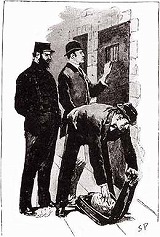In town the earliest risers were just beginning to look sleepily from their windows as we drove through the streets of the Surrey side. Passing down the Waterloo Bridge Road we crossed over the river, and dashing up Wellington Street wheeled sharply to the right and found ourselves in Bow Street. Sherlock Holmes was well known to the force, and the two constables at the door saluted him. One of them held the horse’s head while the other led us in.
“Who is on duty?” asked Holmes.
“Inspector Bradstreet, sir.”
“Ah, Bradstreet, how are you?” A tall, stout official had come down the stone-flagged passage, in a peaked cap and frogged jacket. “I wish to have a quiet word with you, Bradstreet.”
“Certainly, Mr. Holmes. Step into my room here.”
It was a small, office-like room, with a huge ledger upon the table, and a telephone projecting from the wall. The inspector sat down at his desk.
“What can I do for you, Mr. Holmes?”
“I called about that beggarman, Boone - the one who was charged with being concerned in the disappearance of Mr. Neville St. Clair, of Lee.”
“Yes. He was brought up and remanded for further inquiries.”
“So I heard. You have him here?”
“In the cells.”
“Is he quiet?”
“Oh, he gives no trouble. But he is a dirty scoundrel.”
“Dirty?”
“Yes, it is all we can do to make him wash his hands, and his face is as black as a tinker’s. Well, when once his case has been settled, he will have a regular prison bath; and I think, if you saw him, you would agree with me that he needed it.”
“I should like to see him very much.”
“Would you? That is easily done. Come this way. You can leave your bag.”
“No, I think that I’ll take it.”
“Very good. Come this way, if you please.” He led us down a passage, opened a barred door, passed down a winding stair, and brought us to a whitewashed corridor with a line of doors on each side.
“The third on the right is his,” said the inspector. “Here it is!” He quietly shot back a panel in the upper part of the door and glanced through.
“He is asleep,” said he. “You can see him very well.”
We both put our eyes to the grating. The prisoner lay with his face towards us, in a very deep sleep, breathing slowly and heavily. He was a middle-sized man, coarsely clad as became his calling, with a coloured shirt protruding through the rent in his tattered coat. He was, as the inspector had said, extremely dirty, but the grime which covered his face could not conceal its repulsive ugliness. A broad wheal from an old scar ran right across it from eye to chin, and by its contraction had turned up one side of the upper lip, so that three teeth were exposed in a perpetual snarl. A shock of very bright red hair grew low over his eyes and forehead.
“He’s a beauty, isn’t he?” said the inspector.
“He certainly needs a wash,” remarked Holmes. “I had an idea that he might, and I took the liberty of bringing the tools with me.” He opened the Gladstone bag as he spoke, and took out, to my astonishment, a very large bath-sponge.

“He! he! You are a funny one,” chuckled the inspector.
“Now, if you will have the great goodness to open that door very quietly, we will soon make him cut a much more respectable figure.”
“Well, I don’t know why not,” said the inspector. “He doesn’t look a credit to the Bow Street cells, does he?” He slipped his key into the lock, and we all very quietly entered the cell. The sleeper half turned, and then settled down once more into a deep slumber. Holmes stooped to the water-jug, moistened his sponge, and then rubbed it twice vigorously across and down the prisoner’s face.